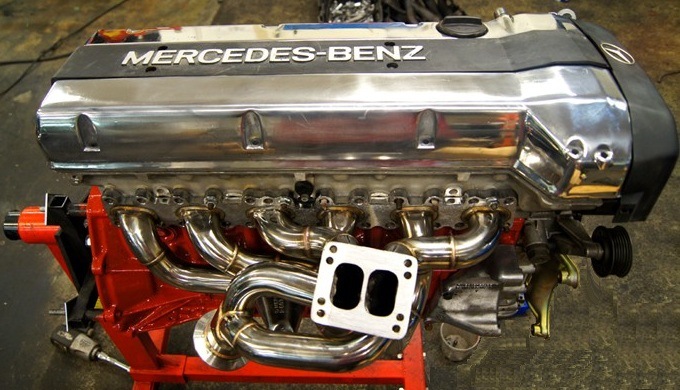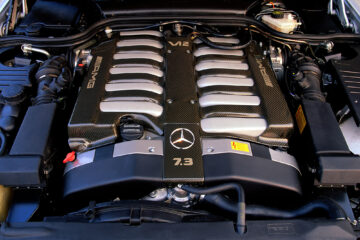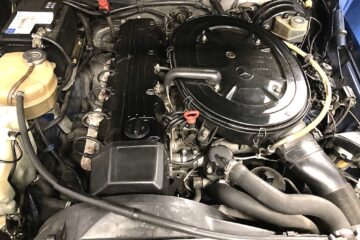The Mercedes M104 family of engines was a reliable and enduring legacy of the company’s history. Produced in three versions – the E28 2.8-liter, E30 3.0-liter and E32 3.2-liter – they offer powerful performance yet are nourished with high levels of control and mobility on the road. Furthermore, those looking for something more demanding could opt for the powerful AMG versions indexed E34 and E36 with 3.4 and 3.6 liters respectively. This range also includes Mercedes’ M103 and M256 engines that have earned renown for dependability over time thanks to their sturdy construction and sophisticated design.
Specifications Mercedes M104
Modification: M 104 E 28
| Displacement | 2799 cc |
| Power system | Injector |
| Engine power | 193 – 197 hp |
| Torque | 265 – 270 Nm |
| Cylinder block | Cast iron R6 |
| Cylinder head | Aluminum 24v |
| Cylinder diameter | 89.9 mm |
| Stroke | 73.5 mm |
| Compression ratio | 9.2 – 10 |
| Engine features | No |
| Hydraulic compensators | Yes |
| Timing Chain/Belt | Chain |
| Variable Valve Timing (VVT) | intake |
| Turbocharger | No |
| Oil capacity/Recommended oil | 7.0 l 5W-40 |
| Fuel type | Regular |
| Euro class | EURO 1/2 |
| Average lifespan | 500 000 km |
Modification: M 104 E 30
| Displacement | 2960 cc |
| Power system | Injector |
| Engine power | 220 – 230 hp |
| Torque | 265 – 270 Nm |
| Cylinder block | Cast iron R6 |
| Cylinder head | Aluminum 24v |
| Cylinder diameter | 88.5 mm |
| Stroke | 80.2 mm |
| Compression ratio | 10 |
| Engine features | No |
| Hydraulic compensators | Yes |
| Timing Chain/Belt | Chain |
| Variable Valve Timing (VVT) | intake |
| Turbocharger | No |
| Oil capacity/Recommended oil | 7.0 l 5W-40 |
| Fuel type | Regular |
| Euro class | EURO 1/2 |
| Average lifespan | 500 000 km |
Modification: M 104 E 32
| Displacement | 3199 cc |
| Power system | Injector |
| Engine power | 220 – 230 hp |
| Torque | 310 – 315 Nm |
| Cylinder block | Cast iron R6 |
| Cylinder head | Aluminum 24v |
| Cylinder diameter | 89.9 mm |
| Stroke | 84 mm |
| Compression ratio | 9.2 – 10 |
| Engine features | No |
| Hydraulic compensators | Yes |
| Timing Chain/Belt | Chain |
| Variable Valve Timing (VVT) | intake |
| Turbocharger | No |
| Oil capacity/Recommended oil | 7.0 l 5W-40 |
| Fuel type | Regular |
| Euro class | EURO 1/2 |
| Average lifespan | 500 000 km |
The dry weight of the M104 engine is 195 kg
The M104 engine number is located on the cylinder block
Fuel consumption двс Mercedes М 104
This example (l/100km) is a 1994 Mercedes E320 with manual transmission:
| City | 14.7 l |
| Highway | 8.2 l |
| Combined | 11.0 l |

What cars use the М104 2.8 – 3.2 l
| C-Class W202 | 1993 – 1998 |
| E-Class W124 | 1990 – 1997 |
| E-Class W210 | 1995 – 1998 |
| G-Class W463 | 1993 – 1997 |
| S-Class W140 | 1991 – 1998 |
| SL-Class R129 | 1989 – 1998 |
| Chairman 1 (H) | 1997 – 2014 |
| Chairman 2 (W) | 2008 – 2017 |
| Korando 2 (KJ) | 1996 – 2006 |
| Musso 1 (FJ) | 1993 – 2005 |
| Rexton 1 (RJ) | 2001 – 2017 |
Engine Reliability
While the Mercedes M104 engine has been designed with the goal of reaching 400,000 miles, many drivers report lasting up to 200,000 miles before requiring any major repairs. This is a testament to the formidable longevity of this engine family, provided that it has been properly maintained and cared for throughout its life. Quality oil usage is also essential for ensuring an impressively long lifespan for your M104 engine, as regular oil changes can drastically improve overall performance and reliability. With proper maintenance and attention, your M104 engine can meet – if not exceed – these optimistic expectations.

Despite few substantial design flaws and reoccurring issues in the M104 engine series, the engine is still widely regarded for its excellent reliability, particularly when compared to other Mercedes and luxury car engines of that time. Several owners report no significant problems until after 200,000 miles. Although overheating, oil leaks and mass airflow sensor replacements are common maintenance chores associated with the M104 engine, this is outweighed by the overall good reliability and long-term durability of these straight-six engines. However, extreme cold temperatures can leave these engines highly vulnerable so it is best to take precautionary measures during winter months.
Mercedes M104 Common Engine Problems
- The Mercedes M104 engine is a highly dependable engine, however certain design flaws can lead to some common issues.
- These issues are more likely to occur in areas with high saltwater concentrations and cold climates.
- Common problems include overheating due to failed cooling fans, faulty mass airflow sensors, and oil leaks due to various design flaws.
Oil Leaks
The Mercedes M104 engine is a reliable vehicle, however it can still suffer from common oil leaks and high consumption at certain times. To minimize any future issues surrounding these problems, make sure to use quality oils and keep up with regular maintenance checks on the gaskets as well as seals in order to prevent extensive damage down the line. Moreover, older engines may also require valve stem replacements which should be done timely if needed – this will help ensure that no further severe damages are caused by continuing oil leakage.


0 Comments